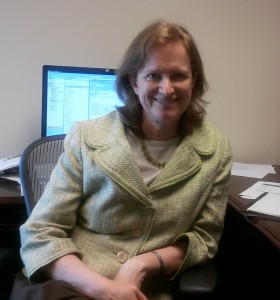 Generation SUNY is celebrating Earth Day early (it’s this Sunday!) with SUNY’s director of sustainability, Deborah Howard.
Generation SUNY is celebrating Earth Day early (it’s this Sunday!) with SUNY’s director of sustainability, Deborah Howard.
Here’s what she had to say:
One of the 6 Big Ideas in The Power of SUNY is SUNY and an Energy Smart New York. Why is this so important?
We take for granted how fundamental to our life energy is. Yet we have been going too long on fumes, using extractive fossil fuels that are often difficult to take from the earth and then when converted to energy release gases that are already changing the climate of the planet.
New York and SUNY need to lead the way on discovering and implementing less painful ways to create energy and more efficient ways to use it. If we are leaders in this field then we will ensure not only that we will be more competitive in our global economy, but that our children’s lives and their children’s lives will not be like the “Hunger Games.”
What are some of the goals of SUNY and an Energy Smart New York?
We want to reduce SUNY’s energy consumption by 30% by 2020. We also want to foster a SUNY culture where we do not miss opportunities to collaborate in our research, academic, and operational endeavors.
What are some of the unique green projects at SUNY campuses?
We have many exciting endeavors to make our SUNY more sustainable. I think the most unique project at this moment is UB’s Solar Strand, which is a sculpture composed of photovoltaic panels that not only pays homage to the DNA strand but provides enough renewable energy to power 700 student apartments.
How will SUNY be marking Earth Day on April 22nd?
Many of the schools will be marking the occasion for not just a day, but will be starting early and celebrating the entire week. SUNY Cortland, SUNY ESF, SUNY Fredonia, SUNY IT, SUNY Oneonta, and SUNY Purchase have had activities and events planned throughout the week.
Other schools, like University at Albany and Binghamton University, have festivities planned for individual days over the weekend.
What are some habits that students could change to reduce their impact on the environment?
First, we all need to realize that every time we plug something in that we are using a mix of energy sources that are mostly created by the burning of fossil fuels.
Also, if we need to buy the next “it” thing, we need to make sure that we buy the version that uses the least amount of energy. Students are big consumers and they need to demand that products use as little energy as possible not only in their hands but when manufactured.
Students can also make easy changes to their personal habits. Easy things like turn off lights and computers when not in use, dress seasonally so we can heat less in the winter and cool less in the summer, and use reusable containers instead of purchasing bottled water.
If you have more ideas for how SUNY can “go green,” share them in the IdeaLab.
Deborah Howard is SUNY’s director of sustainability. Before joining SUNY in January, Howard worked for Washington University in St. Louis on sustainability issues, including helping to draft the university’s strategic plan for sustainable operations; staffing the energy reduction committee; chairing a sustainability awareness committee; spearheading a successful campaign to stop the use and sale of bottled water on campus; and, ultimately, serving as the University’s Interim Director of Sustainability. She is a graduate of the University of Michigan law school and served as a higher education lawyer for the Maryland Office of the Attorney General before joining the administration at Washington University in St. Louis.

